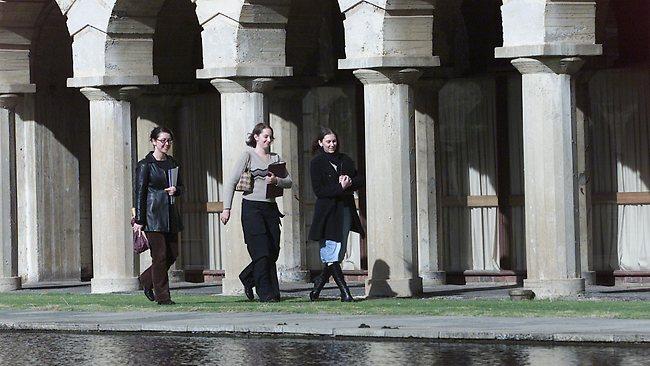Women bachelors still earning less
THE value of a bachelor degree is holding up despite a massive increase in graduate numbers in the past decade.

THE value of a bachelor degree is holding up despite a massive increase in graduate numbers in the past decade.
But women still earn considerably less than men in most occupations just four months after completing their degree - despite making up 60 per cent of graduates.
The annual Australian Graduate Survey reveals that graduates earned on average $52,000 four-months after finishing university, with 76 per cent in full-time employment.
Women were less likely to have been unemployed while looking for a job but earned $5000 less than men whose average income was $55,000.
This trend holds across occupations, with the bizarre exception of earth sciences in which women earned an average of $75,000 to men's $68,000.
Bruce Guthrie from Graduate Careers Australia, which conducts the survey, said the anomoly was difficult to pin down because of the broad number of jobs that fall into the category.
Overall, starting salaries increased by 4 per cent from 2011, with male dentists winning the pay stakes on $92,000 ahead of male optometrists ($82,000). Female dentists, on the other hand, earned just $77,600, with female optometrists on $75,000.
At the other end of the spectrum pharmacists undertaking their compulsory pre-registration year earned the least on $36,000 (men) and $39,700 (women). Graduates in art and design were also paid below average at $42,500 (men) and $40,000 (women).
Carol Kulik, research professor in human resource management at the University of South Australia, said their was a strong body of evidence that clearly demonstrated ongoing pay differences between men and women, even when they graduated from the same degree program with comparable marks.
"One reason is that female graduates are less likely to negotiate job offers - they are more likely to accept the first offer that's presented to them," Professor Kulik said.
"This means that a salary gap is generated right out of the starting gate - and it widens over the course of the career.
"Employers use an employee's current salary as an indicator of competence - if you start out with an artificially low salary in your first job it's hard to regain the ground even when you change employers."
But she said the solution - for women to more aggressively negotiate salary - was likely to backfire and they were likely to leave the bargaining table without the financial result and a tarnished repution.
"Who wants to start off on the wrong foot with your new boss? So you can see how a woman's reluctance to negotiate is actually very self-protective."
While women outnumber men in undergraduate law degrees, women's average salary is $50,700 while men receive $55,000.
Justin Dowd, president of the Law Society of NSW, conceded that "barriers or impediments to the advancement of women in the profession continue to exist".
But he said the survey did not "tell us anything about those factors which influence income, including general and specialist areas of practice and size of firm".
He said it also did not draw a necessary conclusion about people doing the similar work in similar sized firms.
He noted the Law Society had in place several initiatives to address the situation.
Other findings from the survey included graduates with a double degree faired better in the employment stakes than those with a single degree with 80 per cent in full-time employment compared to 76 per cent.
The internet was the most popular form of searching for a job, although three quarters of employed graduates did not find their job using this method.


